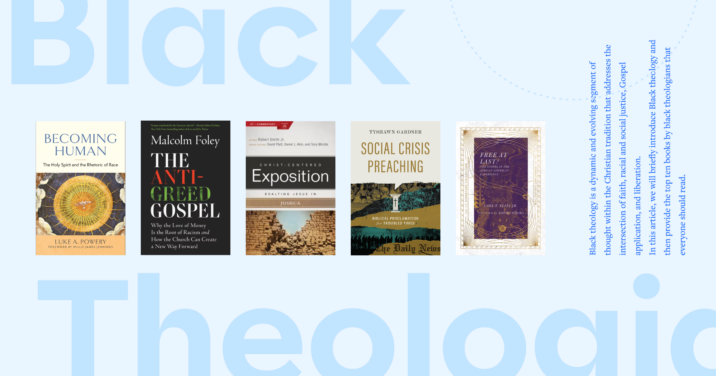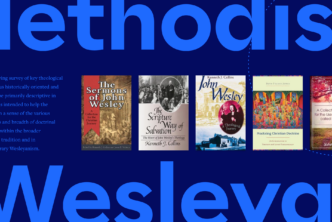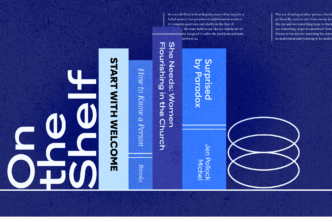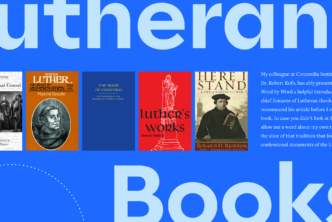Black theology is a dynamic and evolving segment of thought within the Christian tradition that addresses the intersection of faith, racial and social justice, gospel application, and liberation.
In this article, we will briefly introduce Black theology and then provide the top ten books by Black theologians that everyone should read.
What is Black theology?
Context & origins
Arising out of the tumultuous social and political climate of the 1960s, Black theology challenges traditional European-centered narratives that have overlooked, minimized, marginalized, and even misrepresented the historically documented lived experiences of Black Americans. It embraces the prophetic tradition found in both the Old and New Testaments, which emphasizes speaking truth to power in the face of misuse of authority, exploitation, oppression, and the denial of justice to the poor and marginalized.
Black theology, however, isn’t to be forced into a simple oppressor/oppressed binary. Black identity, whether ontologically or symbolically speaking, isn’t characterized by or reduced to definitions of perpetual victimhood or a fixed state of oppression. Rather, Black theology embraces the complex histories of Black people in light of Scripture’s anthropology, which places Black people in spiritually liberated and non-liberated categories while honoring the dignity and inherent value of Black people as image-bearers of God. This theology allows Black people to view themselves in the tension of liberation even within socially captive conditions.
The active faith of Black theology
Black theology achieves a culturally contextualized presentation of the gospel of Jesus Christ. It provides faithful readings of Scripture which allow African Americans to see themselves as included among the nations on whom Yahweh intends to bestow his universal blessing promised to Abraham. These readings also provide an apologetic against any notion that attempts to justify the racial superiority or inferiority of one group to another. It defends the universality, mystery, transcendence, and utter gratuity of God’s love against all idolatrous attempts to identify God’s love with power and privilege.
This theology advocates for those who are oppressed, calls for repentance, and reminds leaders that the divine cares deeply for the plight of the downtrodden, standing in solidarity with those who are excluded, disempowered, disinherited, and disenfranchised. Black theology offers a prophetic critique of social injustices, questioning how the whole counsel of God’s Word can speak to the realities of racism, inequality, and systemic oppression. Theology rooted in the Black experience rightly encourages biblical activism and advocacy where injustices such as poverty, oppression, exploitation, and racism exist. It balances truth and practice without the over- or under-emphasis of orthodoxy or orthopraxy that often occur in evangelicalism and Black liberation theology.
Black theology offers a prophetic critique of social injustices, questioning how the whole counsel of God’s Word can speak to the realities of racism, inequality, and systemic oppression.
Black theology embraces the Bible-based view that God is on the side of the oppressed, which aligns with how God has revealed himself and acted in salvation history, particularly with Israel in the Exodus narrative: He is morally perfect, just, and righteous in every way. Black theology accomplishes this without conflating the truth that God is on the side of the oppressed with the notion that the oppressed are on God’s side solely because of their poverty and oppression. Such a conflation could wrongly suggest that white people, based on their ethnically belonging to an oppressor category, are on the wrong side of God.
The African legacy behind Black theology
But the significance of Black theology also transcends the experiences of African Americans. It roots itself in the substantial contributions of people of African descent who earlier shaped the development of Christian thought.
Early figures like Mark, the North African Jew who authored the Gospel bearing his name, played a pioneering role in spreading the gospel in Africa. He was instrumental in establishing the catechetical school of Alexandria, later led by influential North African theologians like Clement of Alexandria and Origen.
This tradition also encompasses Tertullian of Carthage (in modern-day Tunisia, North Africa), a key figure in early Latin Christianity. He made significant theological contributions, producing extensive theological and apologetic writings against heretical beliefs and developing theological categories, such as his articulation of the Trinity as una substantia tres personae, meaning “one substance and three persons.”
Black theology draws inspiration from Cyprian, the early third-century Bishop of Carthage, who wrote many essays and literary works on baptism and communion. He also organized and led efforts to provide medical help and care for the sick during an epidemic in Carthage. His example foreshadowed the godly leadership of Black Christian thinkers and leaders like Bishops Richard Allen and Absalom Jones, who founded the Free African Society in 1787 to assist formerly-enslaved Black individuals with employment, housing, education, and healthcare, and who ensured dignified burials for those who died during the yellow fever epidemic of 1793.
Moreover, Black theologians build upon the legacy of Alexandrian bishops such as Peter, Alexander, Athanasius, and Cyril, whose writings and teachings strongly defended the orthodox understanding of the Trinity against the Arian heresy. Cyril wrote commentaries on the first five books of the Bible, the Gospels of John and Luke, and several apologetic works.
Contemporary theologians of African descent are spiritual heirs to influential African church leaders like Shenoute of Atripe (in modern-day Akhmim, Upper Egypt), also known as Shenoute the Great, a central figure in Coptic history known for his defense of Christian orthodoxy through his many sermons and theological writings. He refuted pagan Egyptian beliefs and practices, demonstrating the moral and spiritual superiority of the gospel.
They are heirs to the desert fathers and mothers such as Pachomius of Thebes, Egypt, the founder of communal monasticism, and Amma (Mother) Syncletica of Alexandria, known for her selfless love and her dedication to her faith and the poor. The latter gave up her family’s wealth, embraced a life of simple devotion, and cared for her blind sister. She was a respected teacher whose sagacious advice and spiritual guidance focused on holiness and inner struggles. Twenty-seven of the sayings collected in the Sayings of the Desert Fathers are attributed to her.
The intellectual foundations of the Protestant Reformation owe much to Augustine of Hippo, born Aurelius Augustinus in Tagaste, Numidia (present-day Souk Ahras, Algeria). Augustine was a pivotal thinker whose theological insights shaped the ideas of Reformation leaders like Martin Luther and John Calvin.
Given this historical significance, theologians of African descent have consistently played a substantial role in shaping theological thought throughout the history of the church. From early figures such as Simeon, known as “Black,” and Lucius of Cyrene (modern-day Libya)—both influential teachers in the Church of Antioch, the home church of Paul and Barnabas—to the insightful theologians of our time, Black thinkers have been central to the church’s story.
The role & contribution of Black theology
It is, therefore, vital to confront the historical neglect and deliberate omission of Black theological contributions (sometimes referred to as whitewashing and erasure) to Christian theology, particularly in Western contexts. This erasure undermines the intellectual richness of the faith and distorts critical aspects of the gospel which affirm the inherent dignity of all people as created in God’s image and proclaim the equal standing of all believers in Christ.
Further, it deprives the church of diverse and valuable perspectives of members of the only persecuted church in the history of North America. The predominance of white scholars in theological education and publishing has often overlooked the contributions of Black theologians, leading to a limited and one-sided understanding of Christian theology. Without Black voices in academic spaces and in theological publications, the church misses out on valuable insights born from those who have endured racial injustices and served God through challenging times.
Black theology meets this need by amplifying the voices of Black theologians who have been marginalized in mainstream theological conversations and historically excluded from professorships and provost positions at many theological and academic institutions. Black theologians serve a role akin to West African griots, preserving history and tradition. Without the benefaction of African American theological genius, the significance of Black people within the sacred story of God’s interaction with humankind further diminishes—especially when placed against the backdrop of a whitewashed and truncated version of Christianity.
Fortunately, leading Christian organizations are increasingly recognizing the transformative contributions of Black theologians. By engaging with their work, the church is beginning to restore its intellectual and theological diversity. Including Black voices in theological discourse enriches the broader Christian tradition, offering new perspectives on Scripture, ethics, and the gospel’s scope.
This inclusion challenges the church to commit more deeply to prophetic witness, justice, and the dismantling of oppressive systems affecting marginalized communities. Ultimately, the contributions of Black theologians serve as both a remonstrance for forsaking and a rationale for returning to foundational principles of the Christian faith. Black theology calls for the reformation of the church to the prophetic tradition of advocating for the poor and oppressed and reclaiming gospel orthodoxy, orthopraxy, and orthopathy. And it restores appreciation for the diverse spiritual and theological contributions from various ethnicities and cultures within Christianity, which extend far beyond the predominantly represented narratives in many Western churches.

10 books by Black theologians that everyone should read
As a disclaimer, this list is not in any way exhaustive, as there are far too many books that could’ve been included. Further, as will be seen, Black theology is not a monolith, as many of these authors represent the profound complexities and nuances of thought across the theological spectrum.
My desire with this list, though, is to provide an introduction to Black or African American theologians who have influenced me and are, as I believe, hidden gems and unsung heroes in the church.
1. Becoming Human: The Holy Spirit and the Rhetoric of Race, by Luke A. Powery
Powery contends that the Christian narrative, especially as illustrated by the event of Pentecost, reveals that human diversity is a gift from the Holy Spirit to be celebrated rather than feared or overlooked. He urges the church to embody this inclusive Pentecostal vision in its worship and ministry, providing insights on how theology and preaching can more accurately reflect the diverse gifts within the Christian community. Ultimately, Powery advocates for a more just and humane understanding of race that is rooted in pneumatology.
2. The Political Disciple: A Theology of Public Life, by Vincent A. Bacote
Christian faith requires active engagement in the public sphere, including politics, as a vital expression of discipleship. Bacote challenges the tendency among Christians to be indifferent toward political involvement, basing his argument on the Bible’s mandate for humanity to care for creation and love their neighbors.
Bacote highlights that Christian participation in public life should embody Christ-like virtues, such as loving one’s enemies and pursuing justice. He also emphasizes the importance of maintaining a realistic view, given the limitations of political solutions, and practicing lament in response to societal challenges.
3. Liberating Black Theology: The Bible and the Black Experience in America, by Anthony B. Bradley
This text provides a critical analysis of Black liberation theology (BLT), especially as articulated by James Cone.
Bradley argues that BLT’s emphasis on Black victimhood, influenced by Marxist thought, leads to a flawed understanding of humanity, sin, God, and Scripture, ultimately hindering the Black church and obstructing true liberation. He contends that, by prioritizing the Black experience as the primary lens for biblical interpretation, BLT misinterprets Scripture and promotes a separatist mentality that impedes racial reconciliation.
Instead, Bradley proposes an approach grounded in Scripture that recognizes the complexities of the Black experience within a broader orthodox Christian framework.
Liberating Black Theology: The Bible and the Black Experience in America
Regular price: $15.99
4. Reading While Black, by Esau McCaulley
A must-have in every theological library, McCaulley’s book explores the unique and vital contributions of Black biblical interpretation to the wider Christian tradition. McCaulley demonstrates how Black Christians have historically engaged Scripture to address issues of justice, liberation, and hope. His work calls for a deeper appreciation of Black hermeneutics as essential for a fuller understanding of the Bible.
Reading While Black: African American Biblical Interpretation as an Exercise in Hope
Regular price: $12.99
5. Acts: A Theological Commentary on the Bible, by Willie James Jennings
Jennings offers a compelling theological reading of Acts, focusing on the Holy Spirit’s disruption of racial and cultural boundaries. Jennings highlights the radical inclusivity of the early church and challenges contemporary understandings of identity and belonging within Christian community. The commentary emphasizes the transformative power of the gospel to create a truly diverse and reconciled people.
6. For God So Loved the World: A Blueprint for Kingdom Diversity, by Walter R. Strickland II
Strickland argues that God’s love for the world inherently includes a love for its diversity, offering a theological framework for understanding and embracing ethnic and cultural differences within the church. He examines biblical texts to demonstrate God’s intentional design for a multiethnic kingdom. The book provides practical insights for fostering genuine unity and celebrating diversity in Christian communities.
7. Free at Last?: The Gospel in the African American Experience, by Carl F. Ellis Jr.
A master of categorical analysis, Ellis examines the historical and ongoing relationship between the Gospel and the African American experience, highlighting themes of liberation, suffering, and hope. He critiques both secular and some Christian approaches to racial reconciliation, advocating for a framework distinctively rooted in Scripture, the cross, and resurrection. The book calls for a holistic understanding of the gospel that addresses both spiritual and social realities.
8. Social Crisis Preaching: Biblical Proclamation for Troubled Times, by Tyshawn Gardner
Many pastors avoid addressing the critical issues of the day out of fear of falling prey to the “social gospel” or accusations of being “woke.” Gardner provides a practical guide for pastors and preachers seeking to address social issues with fidelity to Scripture and prophetic voice. He emphasizes the importance of grounding sermons in Scripture while also engaging with contemporary challenges like racism, poverty, and injustice. The book equips preachers to offer messages of hope, justice, and transformation amid societal turmoil.
9. Exalting Jesus in Joshua: Christ-Centered Exposition Commentary, by Robert Smith Jr.
This expositional commentary interprets the book of Joshua through a Christ-centered lens, revealing how the narrative points to the person and work of Jesus Christ. Smith masterfully demonstrates how themes of conquest, promise, and obedience find their ultimate fulfillment in the New Testament. The commentary aims to help readers see the relevance of Joshua for Christian faith and life by highlighting its connection to the gospel.
Exalting Jesus in Joshua (Christ-Centered Exposition Commentary Series | CCE)
Regular price: $11.99
10. The Anti-Greed Gospel: Why the Love of Money Is the Root of Racism and How the Church Can Create a New Way Forward, by Malcolm Foley
This book is sure to shatter much of what you thought about racism, exposing the sin for what it truly is. Foley argues that the root of racism lies not in hate or ignorance but in the insatiable desire for power and money, which he terms “racial capitalism.” He traces the history of racial violence and exploitation in the US, connecting it to modern injustices faced by Black Americans.
Foley calls for the church to resist this greed by building communities characterized by economic solidarity, anti-violence, and a commitment to truth-telling.
The Anti-Greed Gospel: Why the Love of Money Is the Root of Racism and How the Church Can Create a New Way Forward
Regular price: $12.09
Related articles
- Endurance Produced by Suffering: The Black Church in America
- Black Political Theology: An Anti-oppression Faith
- Why the Black Voices Collection? | Chauncey Allmond
- 6 Black Theologians from Church History You Should Know
- 3 North African Church Fathers Every Christian Needs to Know





